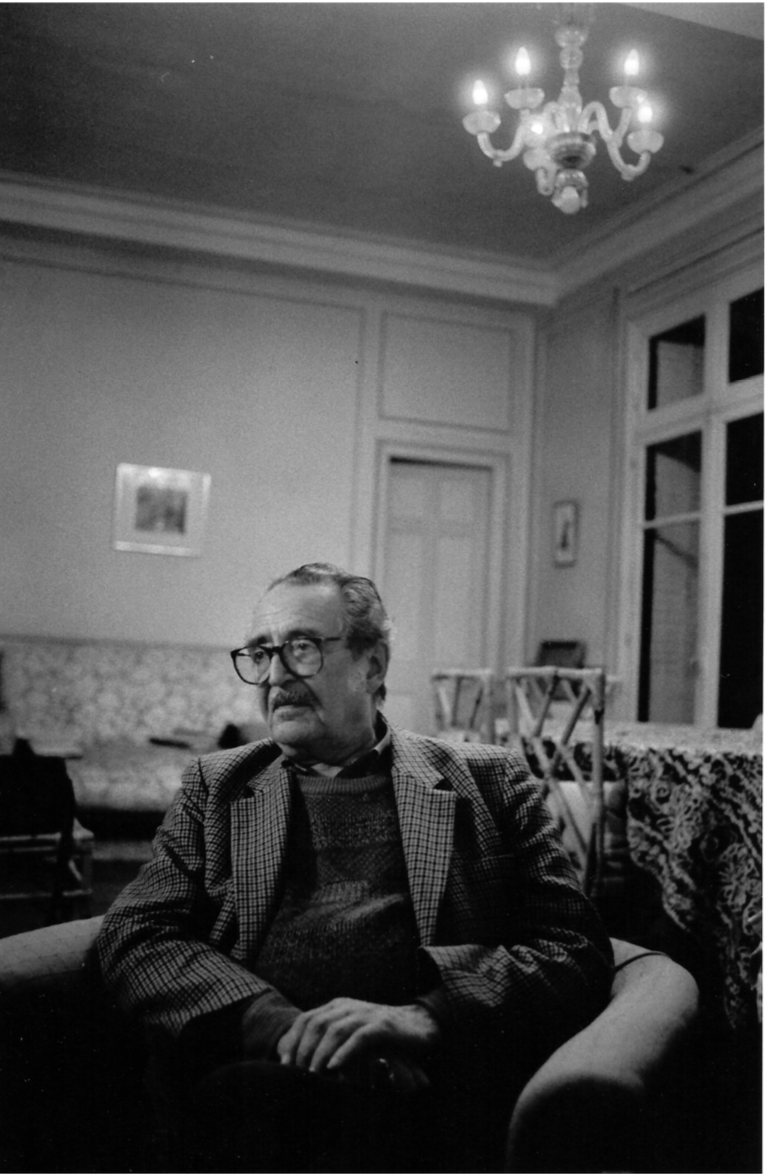Part II: Translation: Paul Celan
Cântec de dragoste (Lovesong)
Paul Celan
Translated by Edouard Roditi and Chris Sawyer Lauçanno
|
Translator's note
by Chris Sawyer Lauçanno Edouard Roditi and I were sitting at a cafe in Paris in the fall of 1991. I believe I had just returned from Zurich, which inspired Edouard to recount meeting James Joyce whom he described as “drunk, overbearing and a bore.” I remember saying that surprised me. “Don't confuse the writer with his work,” Roditi replied. I countered with accolades for Finnegan's Wake, about which I was then writing. (The World’s Words: A Semiotic Reading of Joyce’s Finnegans Wake and Rabelais’ Gargantua et Pantagruel.) My companion did not argue with my assessment of Finnegan's Wake, but used my remark to turn the conversation to Paul Celan and what he did with language. He said something to the effect that both Joyce and Celan reinvented language but in very different ways. For Joyce, English was a source of amusement, where idioms could be toyed with just for the sake of toying with them; for Celan, German needed to be reclaimed, to be purged of the Nazi cast that had perverted it into a language of terror and destruction and misery. “But his Romanian poems,” said Roditi. “Those are something else altogether. Surrealism, Romanian style.” By the time I left the cafe, we had agreed to translate Celan's Romanian poems. |
Edouard was a true polyglot and knew Romanian. I had some knowledge of the language but read it mostly through Latin and the other Romance languages that I knew much better. Not long after our meeting, I went back to the United States. Through letters we worked out how we would translate the poems: we would each draft a translation, then compare and combine and edit. We didn't initially have a lot of poems to work with, as Celan had never published these poems in book form. But Celan's widow Giselle, whom Edouard had known since she first married Celan, promised to give us more of these early poems.
We only managed to do a few before Edouard had an epileptic fit and died from falling down the stairs at a friend’s house in Cadiz in May of 1992. “Lovesong” sat in my filing cabinet for 30 years. In 2020 Alyscamps Press issued two separate essays Roditi had written as part of his memoir, The Age of Improvidence. This prompted me to send “Lovesong” to Karl Orend, publisher and editor at Alyscamps. He issued the poem as a 2021 New Year’s gift to friends of the press.
Fortunately, Celan’s Romanian poems found very able translators: Julian Semilian and Sanda Agalidi (Green Integer, 2003) and Nina Cassian (Sheep Meadow, 2015).
|
Cântec de dragoste
Când vor începe şi pentru tine nopţile dimineaţa Ochii noştri fosforescenţi vor coborî din pereţi, nişte nuci sunătoare, Te vei juca cu ele şi se va revărsa un val prin fereastră, Unicul nostru naufragiu, podea străvezie prin care vom privi camera goală de sub camera noastră; O vei mobila cu nucile tale şi-ţi voi pune părul perdea la fereastră, Va veni cineva şi-n sfârşit va fi închiriată, Ne vom întoarce sus să ne-necăm acasă. — Paul Celan |
Lovesong
When at daybreak the nights for you commence our phosphorous eyeballs will clamber down the walls, strewing walnuts, You will toss them aloft and an ocean wave will come coursing in through the window. Through the translucent floor--our singular shipwreck--we will gaze into the empty room below; With your walnuts you will furnish it, and for curtains for the windows I will hang your flowing hair, Someone will arrive, and finally, it will be rented. Upstairs, we’ll return, to drown alone at home. —Translated by Edouard Roditi and Christopher Sawyer- Lauçanno |
Permission to reprint, Karl Orend, Alyscamps Press, Paris, 2021.

